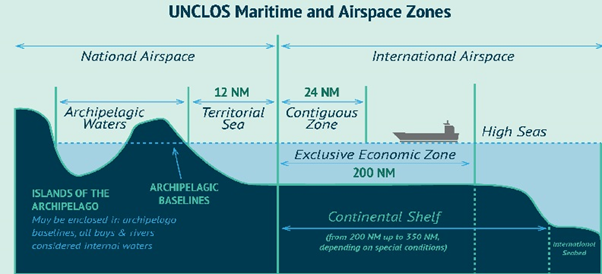

18th August 2022 (9 Topics)
Context
The U.N. kicked off a conference recently aimed at creating a new, legally-binding global treaty to govern use of the high seas.
- This is the fifth round of negotiations on the international instrument under the UN Convention on the Law of the Sea (UNCLOS).
About
About New Treaty:
- The UN general assembly had decided to convene an Intergovernmental Conference (IGC) in December 2017 to elaborate on the text of the legal instrument for protecting biodiversity in areas beyond national jurisdiction (BBNJ) under UNCLOS.
- The IGC held four formal sessions in September 2018, March 2019, August 2019 and March 2022.
- The ambition of the treaty is to reverse the current downward trend in biodiversity and protect marine life, while also guaranteeing safe access to international waters.
- The treaty will help conserve biodiversity in areas beyond national jurisdiction (BBNJ) that lie outside countries’ 322-kilometre exclusive economic zones.
What would a High Seas Treaty do?
- The "high seas" refers to international waters — sea space that doesn't fall within any nation's sovereign or extended maritime zone.
- About two-thirds of the world's water is considered high seas and, as of today, only about 1% of that area is covered by international agreements on fishing and other resource extraction.
- The high seas treaty, if agreed, would create a new global body to enforce rules laid out to protect about 30% of the world's oceans by 2030.
- It would extend international law beyond countries' territorial waters and exclusive economic zones (EEZs), which extend 200 miles from any nation's coastline, to cover a major portion of the currently unprotected waters from threats such as overfishing and unchecked seafloor mining.
- This treaty will provide a first-ever legal framework for the protection of biodiversity in international waters, including the creation of ocean sanctuaries, environmental rules, and the application of Environmental Impact Assessments preceding any human activities on the waters that make up nearly half of the planet.
UN Convention on the Law of the Sea (UNCLOS):
- UNCLOS was adopted in 1982 and laid the foundation of ocean governance, with the first single set of rules for oceans and seas.
- There are two more instruments under the Convention:
- The 1994 agreement on the implementation of Part XI of UNCLOS
- the 1995 UN Fish Stocks Agreement
- The treaty on BBNJ will be the third legal instrument under the convention.



